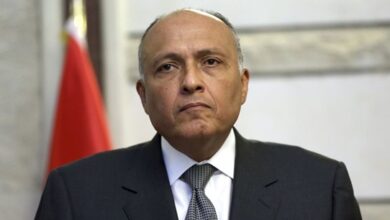How strange Egyptian politics are becoming. The launch of a “popular campaign” in the last few weeks to encourage Gamal Mubarak to run for presidency appears to have begun the presidential succession process in earnest, after years of official denial that such a thing could happen in Egypt. Allegedly financed by a wealthy member of the ruling party’s general secretariat, the campaign has modeled itself on the anti-tawreeth (inheritance of power) movement: It mirrors Mohammed ElBaradei’s campaign to collect a million signatures for constitutional change. Bizarrely, the campaign is even headed by a member of the opposition Tagammu party. There must be a chronic lack of imagination among that part of the ruling elite that would like to see tawreeth succeed.
Since 2002, when Gamal Mubarak entered national politics for the first time, a key feature of Egyptian politics has been a rather odd cognitive dissonance. The public is told one thing, but believes its opposite to be true. When democratic reforms are announced by the government, the opposition speaks of a plot to close the little space for freedom that exists–as during the 2007 constitutional amendments. Public figures who are ineligible for the presidency continually announce their candidacy, while much more likely and eligible personalities remain mum about their plans. But there is no greater example of the contradictions of Egyptian political discourse than the trajectory of Gamal Mubarak.
On the one hand, it is clear that Gamal has firmly asserted his control over the ruling National Democratic Party (NDP), and that his role in executive decision-making goes well beyond his official post in the party. Today, very few Egyptians would doubt that Gamal is a more important person in government than Prime Minister Ahmed Nazif and most other ministers, even if he has no formal powers outside his party and has never been elected or appointed to any executive position. Most think he has his sights set on the presidency, following the inheritance of power model seen in Syria. Except that in Syria, it had been clear for at least a decade that Hafez al-Assad wanted one of his sons==at first Bassel, then Bashar–to take over after him.
On the other hand, Gamal Mubarak and his father have both denied that he is being groomed for the presidency. President Mubarak has stressed that what happened in Syria cannot happen in Egypt, and Gamal has repeatedly said that his role, for now, is confined within the party. Of course, some will remember that in 1999–when Gamal was said to be considering the launch of a new party, to the alarm of political bosses–both father and son denied he had any interest in politics. Some explained that it was not so much Gamal who was interested in the presidency as those who ride his coattails, and that the role of heir apparent was forced upon him.
Even as the tawreeth scenario was being denied, no alternative was ever constructed, and a kind of strategic ambiguity has since prevailed. It looks like Gamal is being groomed, but it is never stated outright. Officials repeat that the next president will be elected according to the constitution, but no vice-president (and heir apparent) has been appointed, even though the constitution calls for one. And now, we are expected to believe that a popular campaign to “draft Gamal” has spontaneously come alive, out of nowhere, without its candidate’s blessing.
There are two ways to interpret this ambiguity. One is that a tawreeth scenario is inevitable, and that a pre-ordained script is being followed to give Gamal Mubarak a veneer of legitimacy. Once the well-financed popular campaigns, which have targeted low-income areas first, “gather” enough signatures he will give the appearance of reluctantly accepting the heavy burden of power. It’s a scenario that has been played out elsewhere, in which popular support is bought and paid for among the poorest segments of the population, for whom elections and politics have in any case always been a farce.
To me, this is not altogether convincing. If the path to tawreeth was already won, it would have been made crystal-clear a long time ago that Gamal is the next president, as in Syria. Something–splits within the elite, lack of confidence, perhaps even Hosni Mubarak himself–has placed obstacles in its path. It may even be, quite simply, that enough Egyptians have had the courage to speak out against tawreeth, from Kefaya activists, to politicians like Ayman Nour and national figures such as Muhammad ElBaradei. Such opposition has made things difficult for Gamal, though not impossible. But that the man many assume is Egypt’s next president can’t just come out and state his intentions is telling not just of ambiguity, but of a larger uncertainty over what will happen in the next year.
Issandr El Amrani is a writer on Middle Eastern affairs. He blogs at www.arabist.net. His column appears every Tuesday.




